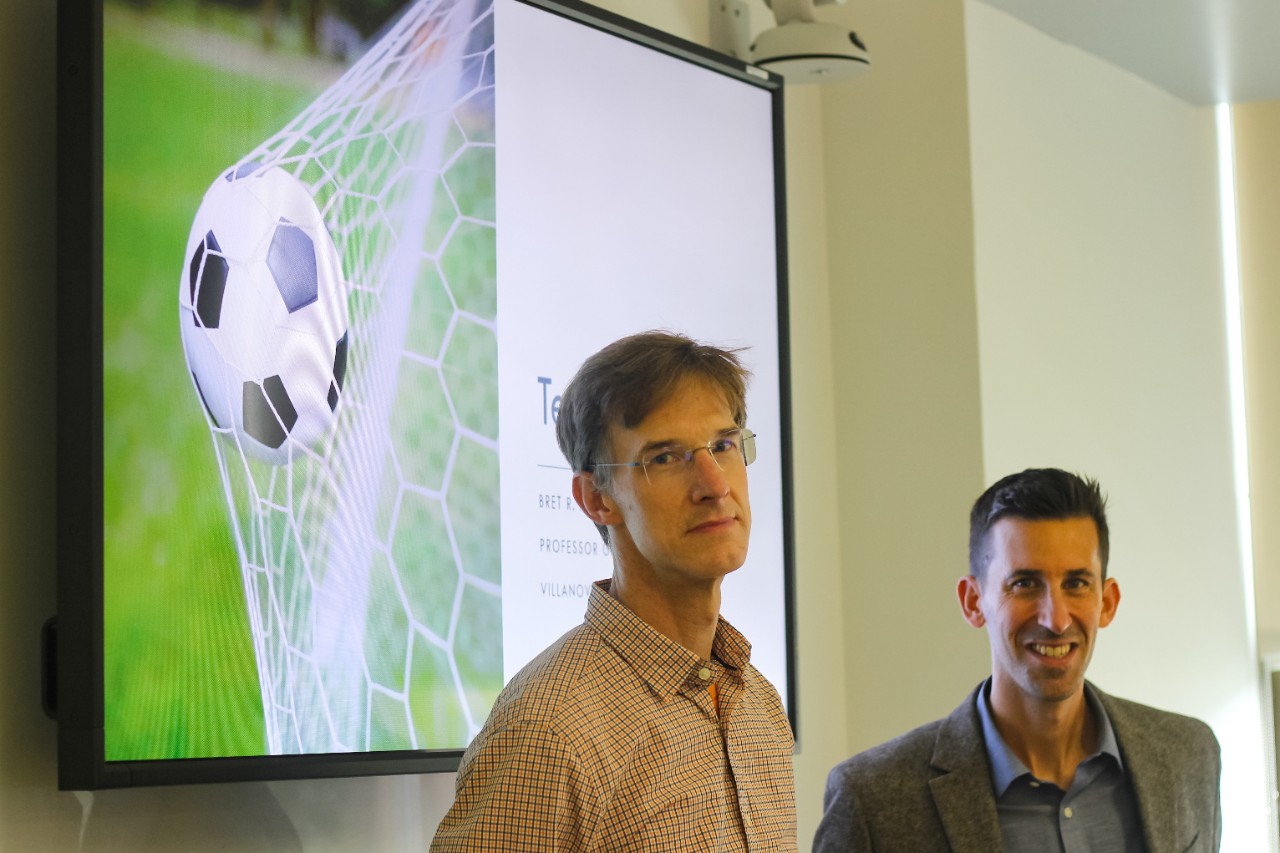From the Pitch to the Classroom: New Course Connects History and Data Analytics to Explore the World of Soccer

On Apple TV+’s Ted Lasso, star player Dani Rojas proclaims, “Football is life.” Football meaning soccer in American English. Regardless of the language, the euphoric feeling remains when you step into the classroom of a new multi-disciplinary course at Villanova.
Bret Myers, PhD, teaching professor in the Management and Operations department at the Villanova School of Business, and Paul Steege, PhD, associate professor of History in the College of Liberal Arts and Sciences, are kicking off the course, “Global Soccer from Historical and Data Analytical Perspectives,” which merges their different expertise on soccer.
Steege has taught a “History of Soccer” course, while Myers teaches “Analytics in Sports Business” and “Programming in R and Python” courses. Myers also has professional analytics experience, currently serving as a consultant with Columbus Crew SC in Major League Soccer. Both professors offer important perspectives on the sport and merged their disciplines together to form this unique course, with the goal for students to learn the historic and global significance of soccer.
“Whether you're somebody who is focused on data analytics, history or another discipline, one of the really important things is to be able to articulate your ideas and to share them effectively,” said Steege.
Before the start of the course, students were sent a survey to assess their knowledge of the sport and any other language abilities. While students had a wide variety of soccer knowledge, they also reported proficiencies in other languages. So, for the final, they will complete a research project about the sport in another country. Students will use the skills they’ve learned and their foreign language backgrounds to explore their country’s history and relationship with soccer.
“It’s just really fascinating to look at the historical perspective on this as a global sport and then bringing a modern component of analytics into it,” Myers said. “We're going to teach students how to program in R and then some of the necessary data manipulation and visualization analysis skills they will need.”
“We’re going to ask students to analyze data that comes from the game. But we also want them to recognize that these analytical categories have a history, too; and knowing that history can help frame the kinds of questions we ask about this material,” says Steege.
But the goals of the course extend beyond these perspectives.
During the first week of class, they discussed the situation in Afghanistan and the 17-year-old midfielder from their national team who was killed trying to escape and how Australia helped evacuate dozens of female athletes from Afghanistan, including members of the women's national soccer team.
“The stuff that happens inside the game, is also connected to things that happen outside the game,” says Steege. “Soccer is connected to the cultural and political situation of these places. As much as we want to think about soccer as this separate entity, it’s very much connected to these broader issues.”
The course will be developing in real time with other events happening in the soccer world.
“We’re in a very intensive period right now of activity, leading up to a World Cup there has been COVID disruption and the piling on of games,” says Myers. “There’s still some uncertainty to whether or not the World Cup will actually happen in 2022, but we still have the qualifying matches taking place around the world. We want to talk about those things, and we have blogs set up where students can talk about these current events.”
The course will incorporate speakers from various different areas of expertise to show an array of perspectives. Guests include:
- Shireen Ahmed, a freelance journalist and an activist in Toronto who works on questions of women's sports and Islamophobia in sports.
- Chris Anderson, author of The Numbers Game: Why Everything You Know About Soccer is Wrong.
- Grant Wahl, soccer analyst for CBS Sports.
The course was made possible through Villanova Integrated Academics, which offer experiential and cross-disciplinary opportunities for students.
“We’re excited for the semester, and that hopefully the product of what the students are experiencing is going to be really enjoyable,” said Myers. “For example, having them gain an appreciation for diversity and different cultures, but yet have a technology and analytics emphasis too––that would be a great takeaway from this course.”
